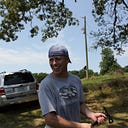Member-only story
The Sacrifice of the St. Paul Thunderbolt
Billy Miske is the holiday hero you don’t know about

“Billy Miske, a middleweight of St. Paul, Minn., has arrived in the city. He has issued a challenge to any of the boys of his weight.” (Milwaukee Free-Press, September 14, 1913)
One of the biggest, bravest men in history stood just six feet tall and weighed around 160 pounds. Pasty white, knobby knees, and fists that flew faster than even his nickname insinuated: the St. Paul Thunderbolt.
Billy Miske was a boxer, a man greased with grit and determination. Born in 1894, his glory years were destined to fall in decades rife with penny-pinching and hungry mouths. He married, had kids, and was broke. Dead broke.
But Miske used the skills God gave him to make ends meet: he bawled his fists and thrashed opponent after opponent in the ring. His style was orthodox; not sexy, not flashy, but quick and decisive. Each jab, each hook, each uppercut was thrown with purpose, whether they landed or not. In preparation for each fight, Miske would literally punch himself in his own jaw 10 times daily.
Miske fought toe-to-toe with some of the greatest boxers of the era: Jack Dempsey, Harry Greb, and Battling Lavinsky among others. In his illustrious career, he accumulated somewhere around 45 wins, 34 by knockout. The early 1900s are known as the “No Decision” era, meaning that in some states a match not decided by a knockout was considered a no-decision, and thus didn’t fit into the boxer’s overall record. Miske could easily have close to 100 career wins were it not for the time period in which he fought.
But the knockouts didn’t matter to Miske. His family did. He would do whatever he needed to provide for them, and if grinding through 15 rounds of dizzying punches would do that, he was all for it. But in 1919, his time in the ring appeared over.
Throwing in the towel?
At the ripe age of 24, Miske told his trainer, Jack Reddy, he was feeling more tired than usual. Naturally, he attributed it to boxing. After a few doctor’s visits, however, Miske learned the grave news: he was battling Bright’s disease, a serious condition of the kidneys for which there was no cure. Doctors gave Miske about 5…
